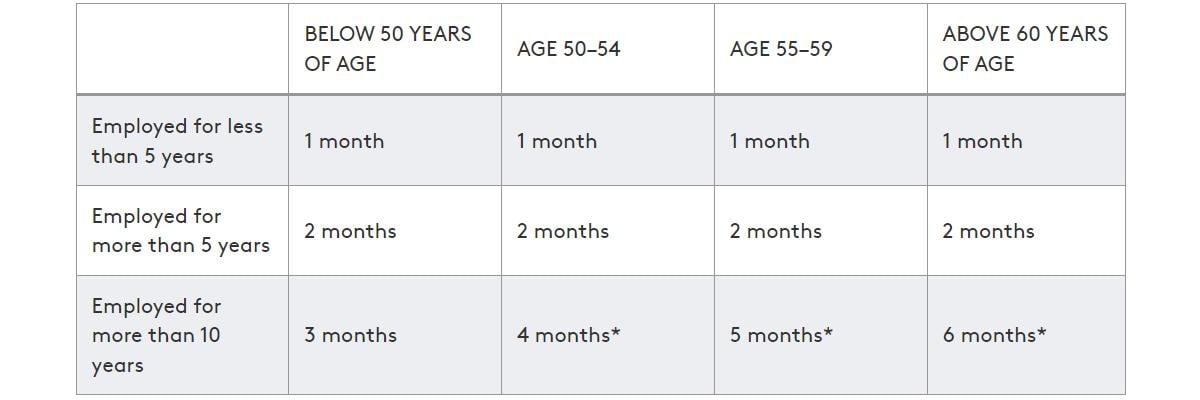EXPLAINED: What you should know if you want to quit your job in Norway

Leaving a job is always a challenging decision to make. However, if you decide to take that route, it helps to be familiar with the resignation rules in Norway and the potential impact it could have on your residence rights.
In Norway, an employment relationship ends when either the employee or the employer submits a written notice of termination to the other party.
There are strict rules in place that regulate what this termination of employment should look like and how it should take place for both sides involved.
In most cases (if we're talking about standard, indefinite employment contracts), your employment will not end on the day you resign.
You'll need to fulfil your obligations in line with your notice period, which is set forward in your employment contract or your collective agreement (if one applies to you).
In this guide, we will cover all the key things you should know both before and after quitting your job in Norway.
READ ALSO: The probation period rules new employees in Norway need to know
The notice period
For most employees in Norway, the resignation process is governed by the Working Environment Act (Arbeidsmiljøloven). However, if you're a government employee, some parts of the Civil Service Act (Statsansatteloven) will also be relevant.
In Norway, there are no formal requirements that relate to employee resignations, except for the fact that the resignation must be submitted in writing.
However, the Norwegian Labour Inspection Authority (Arbeidstilsynet) advises employees to hand in their resignation notices to their employer in person or by registered post. By doing so, you'll avoid any uncertainty in the future about your resignation date or notice period.
As for the notice period, its duration changes based on how long the employee has been employed and the age of the employee.
The notice period regulations also apply to temporary employees if they end their employment relationship before the end of the contract. If your contract doesn't set forward guidelines on the duration of the notice period, the following timeframes will apply:

The standard duration framework for the notice period in Norway. Screenshot: Norwegian Labour Inspection Authority
If you resign on your own accord, know that the notice period will always be at most three months.
Generally speaking, the notice period runs from the first day of the month following the month in which you give notice to your employer.
So, if you submit your resignation notice to your employer on August 15th, the notice period will run from September 1st.
You can find more details on the specifics of notice periods in Norway on the webpage of the Labour Inspection Authority.
Can I apply for unemployment benefits?
Even if you quit your job, you're allowed to apply for unemployment benefits in Norway.
It's important to be aware of several restrictions:
Ideally, you should apply for unemployment benefits one week before the last day you're entitled to get a salary from your employer. In order to avoid losing days on unemployment benefits, you must, at the latest, apply for them on the day when you're no longer entitled to a salary at your old workplace.
As the Norwegian Labour and Welfare Administration (NAV) points out on its website, if you had reasonable cause to resign from your job (such as being unable to continue in your job due to health issues or having experienced harassment in the workplace), you'll get unemployment benefits from the first day you're eligible for them.
However, if you did not have reasonable cause to resign from your job, you will not get unemployment benefits for the first 18 weeks after quitting.
In any case, you'll need to apply for unemployment benefits. After you apply, the NAV will assess whether you had reasonable cause to resign (know that they will require documentation supporting your claim of reasonable cause).
Am I entitled to a reference?
By law, once you carry out your notice period, you're entitled to a written reference from your employer.
As a minimum, the reference should state your name, date of birth, the nature of the work you carried out, and the duration of your employment.
What to do if a dispute arises?
In the event of conflict or disagreement regarding your resignation or notice period, you should seek legal assistance. If you're a member of a labour union, it's also a good idea to consult them.
If you need general guidance on the regulatory provisions that apply in your case, you can also contact the Labour Inspection Authority.
Could it impact my residency?
If you hold a work permit there are a number of steps you will need to take after you leave your job. The first step is to notify the police in your area within seven days. After that, you can stay in Norway for up to six months to look for a new job.
If you already have a new role lined up, you may need to apply for another work permit. This is if the role and duties are different to the job you initially held.
If you succeed in getting a new job but are going to work in the same type of position as before, you do not need to apply for a new residence permit.
Still, you need to notify the police in your area within seven days after you start working at the new job.
Other residence types are largely unaffected by a potential resignation. If you are unsure about how a change of jobs could affect your residence contact the Norwegian Directorate of Immigration (UDI).
Comments
See Also
In Norway, an employment relationship ends when either the employee or the employer submits a written notice of termination to the other party.
There are strict rules in place that regulate what this termination of employment should look like and how it should take place for both sides involved.
In most cases (if we're talking about standard, indefinite employment contracts), your employment will not end on the day you resign.
You'll need to fulfil your obligations in line with your notice period, which is set forward in your employment contract or your collective agreement (if one applies to you).
In this guide, we will cover all the key things you should know both before and after quitting your job in Norway.
READ ALSO: The probation period rules new employees in Norway need to know
The notice period
For most employees in Norway, the resignation process is governed by the Working Environment Act (Arbeidsmiljøloven). However, if you're a government employee, some parts of the Civil Service Act (Statsansatteloven) will also be relevant.
In Norway, there are no formal requirements that relate to employee resignations, except for the fact that the resignation must be submitted in writing.
However, the Norwegian Labour Inspection Authority (Arbeidstilsynet) advises employees to hand in their resignation notices to their employer in person or by registered post. By doing so, you'll avoid any uncertainty in the future about your resignation date or notice period.
As for the notice period, its duration changes based on how long the employee has been employed and the age of the employee.
The notice period regulations also apply to temporary employees if they end their employment relationship before the end of the contract. If your contract doesn't set forward guidelines on the duration of the notice period, the following timeframes will apply:

If you resign on your own accord, know that the notice period will always be at most three months.
Generally speaking, the notice period runs from the first day of the month following the month in which you give notice to your employer.
So, if you submit your resignation notice to your employer on August 15th, the notice period will run from September 1st.
You can find more details on the specifics of notice periods in Norway on the webpage of the Labour Inspection Authority.
Can I apply for unemployment benefits?
Even if you quit your job, you're allowed to apply for unemployment benefits in Norway.
It's important to be aware of several restrictions:
Ideally, you should apply for unemployment benefits one week before the last day you're entitled to get a salary from your employer. In order to avoid losing days on unemployment benefits, you must, at the latest, apply for them on the day when you're no longer entitled to a salary at your old workplace.
As the Norwegian Labour and Welfare Administration (NAV) points out on its website, if you had reasonable cause to resign from your job (such as being unable to continue in your job due to health issues or having experienced harassment in the workplace), you'll get unemployment benefits from the first day you're eligible for them.
However, if you did not have reasonable cause to resign from your job, you will not get unemployment benefits for the first 18 weeks after quitting.
In any case, you'll need to apply for unemployment benefits. After you apply, the NAV will assess whether you had reasonable cause to resign (know that they will require documentation supporting your claim of reasonable cause).
Am I entitled to a reference?
By law, once you carry out your notice period, you're entitled to a written reference from your employer.
As a minimum, the reference should state your name, date of birth, the nature of the work you carried out, and the duration of your employment.
What to do if a dispute arises?
In the event of conflict or disagreement regarding your resignation or notice period, you should seek legal assistance. If you're a member of a labour union, it's also a good idea to consult them.
If you need general guidance on the regulatory provisions that apply in your case, you can also contact the Labour Inspection Authority.
Could it impact my residency?
If you hold a work permit there are a number of steps you will need to take after you leave your job. The first step is to notify the police in your area within seven days. After that, you can stay in Norway for up to six months to look for a new job.
If you already have a new role lined up, you may need to apply for another work permit. This is if the role and duties are different to the job you initially held.
If you succeed in getting a new job but are going to work in the same type of position as before, you do not need to apply for a new residence permit.
Still, you need to notify the police in your area within seven days after you start working at the new job.
Other residence types are largely unaffected by a potential resignation. If you are unsure about how a change of jobs could affect your residence contact the Norwegian Directorate of Immigration (UDI).
Join the conversation in our comments section below. Share your own views and experience and if you have a question or suggestion for our journalists then email us at [email protected].
Please keep comments civil, constructive and on topic – and make sure to read our terms of use before getting involved.
Please log in here to leave a comment.